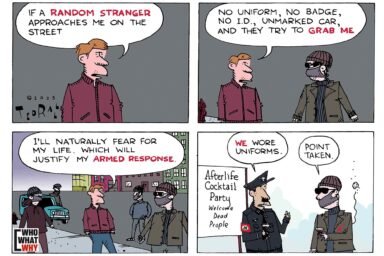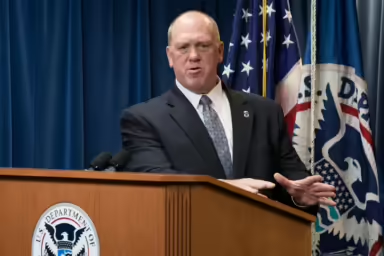Trump’s legal team has cited protections from the First Amendment for the former president’s defense, but impeachments follow different rules than criminal or civil trials.
Former President Trump’s second impeachment trial hinges on two defense arguments. The first is that it may be unconstitutional to impeach a former president. The second? That Trump was protected under the First Amendment. That defense simply doesn’t hold water.
While there is a high threshold for when speech can be blamed for inciting violence, Trump does not benefit from that Supreme Court definition.
The First Amendment protects private citizens from prosecution for most forms of speech. It does not protect government officials from being impeached. This means that whether or not Trump’s words can be directly blamed for the January 6 insurrection, the First Amendment holds no sway over his impeachment proceedings, according to legal scholars.
As the world adapted to 24-hour news cycles and constant streams of online information, it allowed Trump’s incendiary tweets to be woven into the folds of normalcy. This came to an abrupt halt when the president was locked out of his Twitter account following his involvement in the insurrection at the US Capitol and was eventually removed from an array of sites including Twitter, YouTube, and Facebook. The First Amendment does not protect the former president from that, either.
After Trump tweeted a two-minute video in response to the January 6 rioters telling them to go home but that “We love you” and “You’re very special,” private citizens and lawmakers alike called on Twitter to take action against Trump, claiming his video fanned the flames of the riots rather than promoting peace.
With the last four years fresh in mind, it’s easy to forget how President Obama used Twitter to send simple well wishes or condolences to fellow leaders. Trump used Twitter to accuse media outlets of fake news, ridicule fellow lawmakers, and indicate policy changes. Twitter was his main communication channel. Though Trump may have thought these Tweets were his constitutional right, social media companies, such as Twitter and Facebook, are private sector companies and therefore have the right to decide with whom to share their platform, even if that select group does not include the president of the United States.
https://www.youtube.com/watch?v=aMeAE4GHmIE
Legally, there is little Trump can do to fight the removal of his accounts. As UC Berkeley political science professor Daniel Schnur points out, however, “There is a legal and practical standard, given the scope that [these companies] have in society.”
Twenty-two percent of American adults use Twitter, and nearly 70 percent of Americans use Facebook according to the Pew Research Center. With access to such a high volume of people’s daily media interactions, social platforms have received pressure from both sides of the aisle to change the ways they operate.
In 2020, Twitter introduced labels and warning messages to its platform to help combat the spread of misinformation. From that point forward, Twitter tagged tweets that presented misleading information, including many of Trump’s posts. Given Trump’s extreme influence, companies were forced to wrestle with the societal impact of the controversial information being shared on their platforms.
Despite wanting to remain neutral in this political debate, companies were unable to stay quiet after the events on January 6 and the role their platforms played in them.
Twitter’s CEO Jack Dorsey responded to this criticism in a series of tweets, expressing how he took neither pride nor pleasure in blocking Trump but that the company had done so out of a precaution for safety.
Given the diehard nature of the former president’s supporters, these actions were not taken lightly by much of the conservative base. Many accused the company of promoting leftist views and taking personal politics into business.
Previously, companies such as Twitter, YouTube, and Facebook were able to shield themselves from action by citing section 230 of the Communications Decency Act of 1996, which exempts social media platforms of any responsibility or civil liability for what is posted on their site. Following recent events, however, these companies have been increasingly pressured to regulate their sites, given their profound influence in our society.
“It is a tricky line for the social media companies to walk on,” Schnur said. “They argue that they are just a tool of technology, [and] they do not have, nor should they have, control over what is posted on their platform.”
Even if it is argued that these private companies have become so ingrained in society that they should not be able to decide what stays on their platform and what gets taken down, Trump’s use of the platform is still not constitutionally protected.
Donald Trump Managed To Lose It All. That Doesn’t Mean It’s the End
Under the umbrella of the First Amendment, there are several narrow exceptions to the right of freedom of speech, including “incitement.” The exact verbiage by the court in Brandenberg v. Ohio (1969) states speech directed at inciting or producing imminent lawless action is forbidden. This “incitement” exception is commonly known for preventing someone from yelling “Fire!” in a movie theater.
Before the congressional certification of the presidential election results, Trump told the rioters to “fight like hell” or they wouldn’t have a country to fight for anymore. He ended his speech by telling them that they would walk down Pennsylvania Avenue to the Capitol Building.
This speech, along with the “I love you” video, could be disqualified from protection under the First Amendment as directed toward inciting imminent, lawless action, in violation of the Constitution.
Though this criminal case may be winnable in a mock trial of a law class, in reality, it’s much harder to substantiate, especially against the president of the United States.
“That’s not to say that the case could not be proven against the president because he did not explicitly tell his followers to act in a certain way,” Schnur said. “[But] because his guidance is more general, it would be a hard sell for a prosecutor.”
Impeachment, however, is an entirely different ballgame. Under precedents set by the Supreme Court, high-level policy makers have less protection under the First Amendment than most citizens. The Court decided that lower-level government employees have some protections via the First Amendment and could not be persecuted for party affiliation or opinions, provided the speech did not address matters of public concern. In a separate case, however, the Court stipulated that a higher level of government employee had much less protection. Furthermore, the impeachment process is meant for abuses of power and undermining the Constitution, not for violating criminal law. Trying to reverse the outcome of a secure and legitimate election may fall under that umbrella. That is what the trial is assessing.
Though it’s unclear what will happen regarding the conviction of former President Trump, one guarantee is he won’t be able to Tweet about it.
Related front page panorama photo credit: Adapted by WhoWhatWhy from Blink O’fanaye / Flickr (CC BY-NC 2.0).



